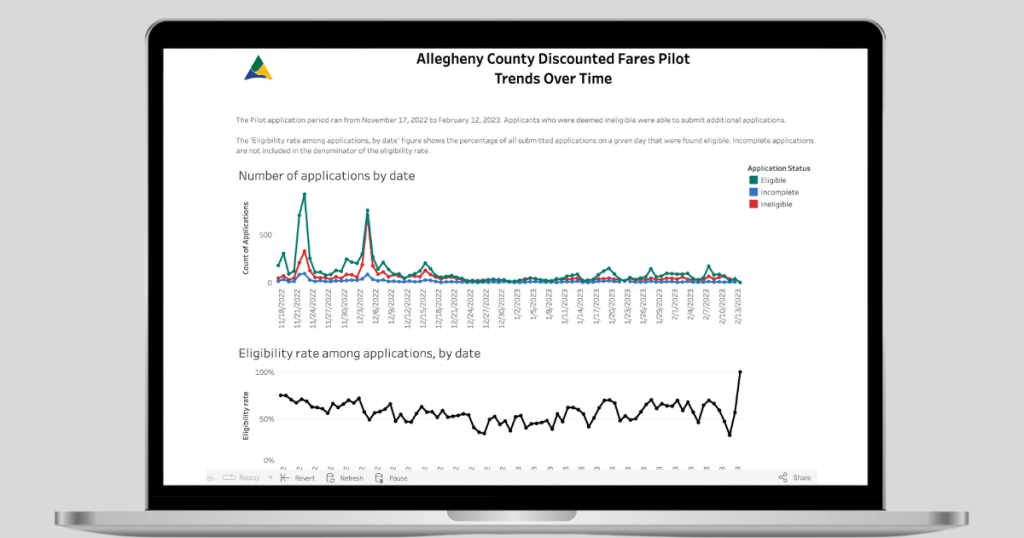
Allegheny County’s new zero fare/discount fare pilot project is proving to be a massive benefit for families across the county
Last year, transit riders with PPT and allied organizations Just Harvest, the Pittsburgh Food Policy Council and UrbanKind Institute won a year-long low income transit fare pilot for 14,000 residents, funded and evaluated by the County Department of Human Services (DHS). In this program, a third of enrollees were given free fare cards, a third were given half fare cards, and a third were enrolled in a control group that received $10 on a Connect Card.
Enrollees in the program like Ms. Tameeka Jones-Cuff, who were provided free fares, show how removing barriers to transit access has been life-changing. PPT member Dean Mougianis interviewed Tameeka, and she shared that not worrying about transit fares has allowed her and her children to get caught up on needed doctor’s appointments and physical therapy:
New Pilot Program Dashboard gives new insights into program and impact on participants
The Allegheny County Dept. of Human Services has now also released aggregate data on people enrolled in its Discounted Fare Pilot Program through a public dashboard. The data show the extremely high demand for the program with nearly 16,000 applications across the county, and an acute need for a long-term program. The early data, along with participant testimonials, show that the program is reaching those in need and having transformative benefits.
Participants in the program are primarily heads of households with children, most of whom are sole providers. Many of the program participants are working or looking for work. PPT has long said that Pittsburgh Regional Transit (PRT) has had a poor tax on riders through its cash fare costs– that is, that riders who pay for transit with cash are often very low-income and pay significantly more than other riders for transit.
Astonishingly, the majority of enrollees in the program paid for transit with cash in the week prior to joining the program, with the majority also spending more than $25 a week on transit, higher than the cost of a weekly bus pass.
Other insights from the data dashboard that we noted:
- There were 15,885 household applications, 9,574 of which were deemed eligible for the program. The high number of applicants shows the demand for the program. Over 80% of program participants don’t have access to a car.
- Over 80% of program participants used public transportation to travel to work and to get around generally.
- 43% of the people in the program are working, most are working full time, and most are making about $15/hour.
- A good number of participants (nearly 2,500) identified as unemployed and are presumably looking for work based on their answer selection; those searching for work spend about 3 hours a week in their search.
- Children (6-17 of age) in the program represent the largest age group at 34%. This shows the pilot provides a benefit at a household level, addressing travel needs for families and caregivers.
- 72% of the adult enrollees are women.
We know this program needs to be expanded, with free fares extended to all SNAP households, permanently. That’s why we’ve made it a central demand in the County Executive primary election, held on Tuesday, May 16th. Check out the candidate responses to PPT’s transit questionnaire here, and vote!
Lastly, here’s a beautiful testimonial from Patrice Aaron about how the program has benefited her and her family, interviewed by PPT member Dean Mougianis: